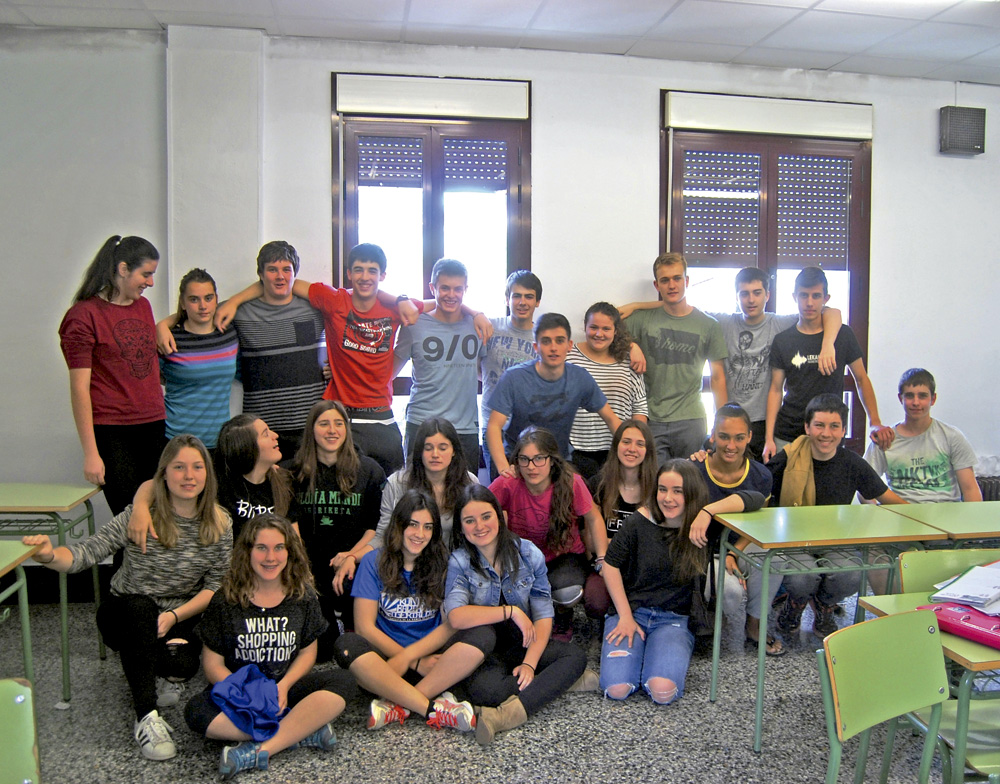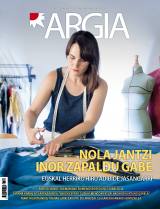Why does one language have more power than another?
- The Commonwealth of Basque Municipalities (UEMA) has stated that although the municipalities are euskaldunifying, the municipalities are being transformed. In view of this, it has launched an education project for citizen awareness and awareness in all educational centers of the municipalities that make up the UEMA. ARGIA has been at the Ikastola Txantxiku of Oñati and at the Elkar Hezi College of Oñati.

In 2015, UEMA began an investigation to learn the perception of the students and professors of the Basque municipalities on the sociolinguistics of the Basque Country. With the results obtained, he has gathered the material and has launched the project called Education for Respirators Project. The aim is for pupils to become aware of the relationship between languages.
In fact, UEMA technicians have considered it important to empower students as vasco-speakers since they are boys and girls, in order to make an analysis of reality. To do so, they have worked on sociolinguistics with ESO and Baccalaureate students. In January and February 2017, two hour-and-a-half sessions with group dynamics took place at Elkar Hezi College in Oñati and at Ikastola Txantxiku.
“We should help extend our language to nearby countries”
As several students have explained, at first they did not believe that this course could have any influence on them and them. Subsequently, however, they claim that they found it to be an important issue. In the words of Itziar Alonso, student of Elkar Hezi: “At first I thought we didn’t need it, because we always talk about Euskera, naturally. But then I realized that it is us who have to help the people who do not breathe to promote the use of the Basque Country.”
In this case, they are respiratory nuclei which are in normal use of the minority language. Therefore, when the main language of a place is the Basque, we could say that this place is a breathing space for the Basques. The concept is not widespread and, therefore, the leadership role they play for the linguistic community of the Basques is not known on many occasions. However, UEMA has considered that "respiratory" are "essential" to ensure the survival of Euskera. For this reason, he stressed the importance of placing the leadership of the citizens in the respiratory zones in the process of normalization of the Basque Country.
In this sense, Jon Aranzabal, a student of Elkar Hezi, believes that oñatiarras have “a great responsibility” in transmitting the tendency to speak in Basque to peoples who are not respiratory zones, “it is also the Basque, and that is what we have to demonstrate”. The students of Txantxiku Ikastola Miren Santos and Leire Egaña think the same thing: “The people who live in the respiratory areas play an important role in the promotion of Euskera. We should help extend our language to nearby countries.” In fact, at the departure of the village some students have said they speak in Spanish, otherwise they think they would not understand them.
“We have to see the series in Spanish because we have no other option”
Each of the activities worked in the course has been focused on a brief reflection. As explained by UEMA, the project works for each student to give their opinion on their trajectory, their reflection or their journey.
Jordi Sánchez, a student of Elkar Hezi, for example, compared the situation of Catalan with that of Euskera: “The use of Catalan is more tender, the natives take more care of the language, because it is also encouraged from the institutions. Here people live comfortably in Spanish. What are you going to learn if you don’t have trouble living in Spanish?”
Some students have also highlighted the importance of adapting Euskera to technology and innovation, as its consumption in Spanish “influences a lot” them. For Danel Iñurritegi, of the Ikastola Txantxiku, there is still no “quality programming in Basque” for young people: “We often have to watch series and programs in Spanish, because we have no other option, and that also has its consequences, especially in the younger ones.”
Oihana Urzelai of Elkar Hezi also spoke about literature: “Some Basque writers may think that if they write in Spanish they will have more sales. But they will get closer if they write to their audience in Basque.” In fact, he explained that Euskera is not a language, “Euskera is culture, our culture, and we have to spread it, because if not, we will lose our Euskaldun being.”
“What we do unconsciously has great value”
Before implementing the course, UEMA identified several needs. Among other things, he explained that students living in a multilingual context do not have a process of Basque normalization in depth: the process of loss, the need to recover it, the need to make linguistic options consciously, etc.
Therefore, students felt it necessary to reflect on their linguistic practices. Through the course, we wanted to show the students the need to respond to the situation of the Basque country.
Most of them have said that speaking in Basque in Oñati is something that comes naturally to them, and they don't know how important it is. That is what Ione Urbina of Elkar Hezi explained: “The course has served me to understand the situation of the Basque Country, after all, what we do unconsciously has a great value.”
In this sense, many have agreed on the need to change the habit of speaking in Spanish to the departure of the people and of helping those who do not speak in Basque in their daily lives. In the words of Aritz Agirre, member of the Ikastola Txantxiku: “It’s more important than the other is thought to help us speak in Basque. Although in Oñati the situation of the Basque Country is good, in some places it is quite bad. Could we end up like this in our people? We are not aware of what is happening and the consequences it may have. Spanish has a lot of power.”
Students have talked about this “power.” Some have pointed out that Castilian has a lot of strength and that Euskera eats itself. Other questions were as follows: “Why does one language have more power than another? Who gives so much strength to Spanish, English or French? Why do we think that Euskera is weaker than other languages?”
In order to seek answers to these questions, Marina Elorza of Elkar Hezi explained that: “We have a great tendency to think that Euskera is a small or weak language. But that's not the case. One of the most important things I have learned in this course is that the Basque Country is not weak in itself, that it is weakened in some places and that it is in our hands to strengthen”.
There are no breathing spaces without proper speakers. Native speakers are the support, the oraceration, the mainstay and the foundation of the respiratory zones.
But let's start at the beginning: what are the respiratory zones? The word Arnasa is a word translated into Basque... [+]
Kaleko 71.000 elkarrizketa eta 227.900 solaskide behatu dituzte UEMAko herrietan, eta 2017koa baino ikerketa are sendoagoa burutu dute. Erabilera orokorra ez da ia aldatu: bostetik hiru aritzen dira euskaraz. Adina eta generoaren arabera badira desberdintasun batzuk.























